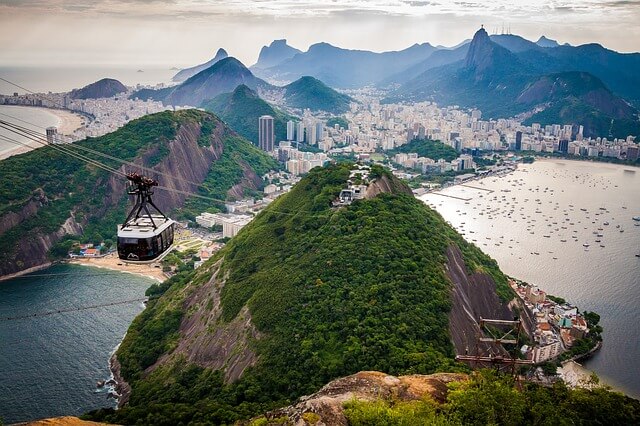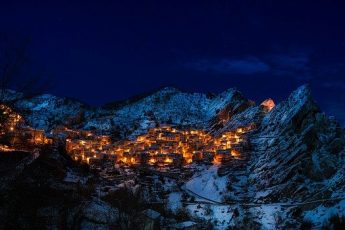The most significant facts about Brazil include rather cheap accommodation, the biggest traffic jams in the world, a notably high crime rate, football as a national idea, the Statue of Christ the Redeemer in Rio de Janeiro being one of the New Seven Wonders of the World.
The economy of the country is galloping ahead, but poverty and crime constantly constrain its growth. São Paulo is the Brazilian financial center and has a population of 22 million, that is why this city is the world champion in traffic jams.
Brazil is a quite rich country: its GDP is more than 2 trillion dollars. Income per capita is higher than $ 11,000 per year. The minimum wage is 545 Brazilian reals ($ 320). It is also the fifth largest country in the world, where 200 million people live. Its area is 8 515 767 km ² (3,287,956 sq mi). This is 47.3% of the total territory of South America. It has on the territory the fullest river with the largest river basin. We mean Amazon. Every second about 209 cubic meters of water flows from it to the Atlantic Ocean.
This is the seventh economy in the world. Brazil is sometimes called a bioenergy superpower. Because it is also the world’s largest producer of ethanol (fuel from sugar cane). Besides, Brazil produces not only coffee and serials, but also cars (almost all leading brands are assembled here), airplanes, oil products, iron ore.
Here are ten fascinating facts about Brazil and its history
- The last 150 years, Brazil is the leader in the production of coffee. Every year, the country gives the world 2.5 million tons of coffee. And 80% of it is arabica. However, the Brazilians admit that their favorite drink is cocoa.
- The reasonable regime of President Lula da Silva, which attracted investors to the country, plus an excellent conjuncture for Brazil’s exports (minerals, oil, food), gave impetus to the country’s rapid economic development. This is evident even to tourists – everywhere there is a colossal construction of buildings and roads.
- Not surprisingly, Brazil is one of the leaders in economic growth among large countries. Its economy grows at 8% per year. But, as the Brazilians say themselves, it could grow even faster if there were not two major problems.The first is poverty. According to the state data, wealthy people in the country make up 5%. Another 30% is the middle class (that was understandable, as the Brazilian population is 70 million people, more than the population of any European country, except Germany). The rest are poor. Nevertheles, during the presidency of Lula da Silva 30 million Brazilians luckily moved from poverty to the middle class.The second problem is the lack of education. Public schools do not give enough knowledge to children. Therefore, parents try to give their children to private schools, but they are very expensive and cost from $ 300 to $ 600 a month. That is why not many Brazilians can afford a good education for their kids.Only 43% of the adult population in Brazil has completed secondary education. For comparison, in Sweden this figure is 87%. Perhaps, because of this, the Brazil state policy consists now in attracting brains and technologies from abroad.
- Any tourist, coming to Brazil, is afraid of meeting criminals. One tourist told such a horrible story that had happened with him in Rio de Janeiro:”I was walking along the Rio River in the evening, passing a tunnel. I had a small bundle of dollars in the pocket of my shirt. The guys came up to me and say: Give us money. I said: No! They cut off my ear with a knife, pulled money out of my pocket, and put my ear there. And what should I do now?”By the way, Brazil does not change money at every step. You can exchange it only in hotels and banks. And you also can’t find banks here on every corner.
- NO ENGLISH. The vast majority of Brazilians do not know English at all. Even such easiest words as: please, thanks, tea, coffee. Actually the word “English” is unfamiliar to them. In public schools pupils start studying English in the fifth grade, but they do not learn more than the verb “to be”. Professional teachers, who really know English, are quite rare and expensive, so only private schools can afford them.
- FORWARD! Starting from the presidency of Lula da Silva, Brazil has been trying to fight both poverty and crime. There is a program of “pacification” of the favela (poor districts). The police enter them with armored vehicles and clean them up from the criminal element using harsh methods (with shooting and corpses). That is why the police of Brazil is considered to be the most brutal among the civilized states. Meanwhile the government organize different trainings for slum dwellers, it also conduct Internet, force children to go to school. While this covers only a smaller part of the slums of the 200 millionth country. But the trend, as they say, is obvious.
- And more that is interesting – the state almost forces the people to choose their future. If you do not go to the polls, then, first, you pay a fine, and secondly, you’ll get on the blacklist. And when you want to buy an apartment, for example, you will have problems.
- From 1808 to 1815, Rio de Janeiro was the capital of Portugal. This happened when the royal family, fearing the occupation of Lisbon, moved to Brazil, which at that time was a colony of Portugal. This is the only case in history when the European capital was outside the continent.
- The city of Brasilia, today’s capital, was built in just 41 months (less than 3.5 years) in 1956-1960. Prior to that, for 197 years, the capital of the country was Rio de Janeiro.
- The statue of Christ the Redeemer in Rio de Janeiro is one of the New Seven Wonders of the World. Its construction lasted from 1922 to 1931 and was timed to the centenary of the independence of Brazil. Each year, about 1.8 million tourists come to visite such a colossal statue.
If you liked the video - share it with your friends:
- Well, and finally everyone knows that everyone in Brazil really has a football fever. Football is the national sport in Brazil. According to statistics, 74.5% of Brazilians of both sexes are interested in football. The Brazilian national team has won the World Cup for five times. Children even wear bibs with images of football players. In a word, passion for football here is absorbed with the mother’s milk.
- To tell the truth another Brazilians’ passion is dancing. In February, Rio de Janeiro hosts the famous Brazilian carnival, which means 4 days of uninterrupted fun, costumed processions and samba.








